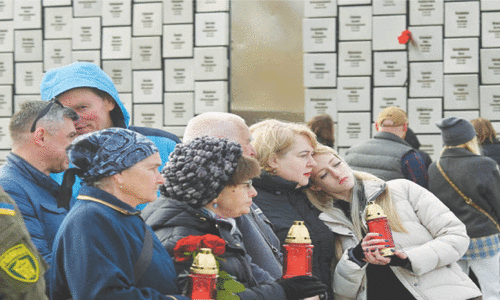
Calling Belfast, Kenneth Branagh’s ode to his childhood, a poor man’s Roma would be cruel. So let me be cruel.
Belfast and Roma, the latter directed by Oscar-winner Alfonso Cuarón, share many posturing similarities. Both are set in the past (coincidentally, 1969 and 1970 respectively), both titles are named after places (Belfast is in Northern Ireland while the Colonia Roma neighbourhood is in Mexico City), both stories are told from a young, innocent boy’s perspective, both boys grew up to be filmmakers — one Branagh and the other Cuarón — both have strong mothers, both stories are set in turbulent times of a community, and both are shot in black-and-white.
There are deviancies, yes. While childhood is innocent, simplicity sets the tone of Branagh’s film. In Cuarón’s film, the innocence is surrounded by extreme severity. Branagh’s mother is a strong resilient parent, but the film isn’t really about her (she is played by the gorgeous Caitríona Balfe who exhibits the aura of a younger version of Cate Blanchett); Cuarón story is a late-life tribute to an under-appreciated maid who cared just as much as any mother.
The communities are also different: Branagh sets his film within the confines of a housing district that’s cordoned off because of riots in Belfast — the setting is Catholic-Protestant, etho-nationalist conflict historically labeled as ‘The Troubles’; Cuarón film builds up to the Corpus Christie Massacre, and a harrowing climax in the sweeping tides on the beaches of Tuxcan.
Kenneth Branagh’s Belfast is sentimental to a degree, but its most eye-catching aspect is its cinematography
While Roma featured one of the scariest, most heart-wrenching scenes in filmdom — the tides sweep away the children, and Cleo (the maid, played by Yelitza Aparicio) wades through the current trying to save them, even though she cannot swim — in Branagh’s film, the closest equivalent to distress is a sweeping shot that revolves around the carefree version of his younger self (played by the excellent Jude Hill), as the streets are invaded by Protestant hordes carrying Molotov cocktails.

Branagh’s younger self — he is called Buddy — doesn’t understand the violence, and the film doesn’t aim to explain that either. If one can decipher it, there is a smart layer within conversations about Catholic and Protestants and, in the broader context, one’s allegiance to the crown. For the most part, however, the conversations fly over Buddy’s head. He is a child after all.
Yes, the film sounds vague in its depiction of history. As the film’s screenwriter, Branagh is more interested in what Buddy sees and feels. He is a young boy who tries to understand his surroundings, but is limited by whatever wisdom his age allows him.
His focus are the simpler things in life: he loves his grandparents (Ciarán Hinds, Judy Dench), fancies a Catholic girl (yes, our boy is a Protestant), idolises his father (Jamie Dornan) who works in England, and who, in the latter half, opts to migrate his family away from Belfast.
Set mostly within the confines of the barricaded community, calling the film a coming-of-age story would be misleading; for that you need a bigger story.
Belfast is sentimental to a degree, yes, but its most eye-catching aspect is its cinematography (another aspect the film shares with Roma, by the way). Haris Zambarloukos, who has been with Branagh since his remake of Sleuth, films Belfast with the eye of a candid photographer. He is the man with the camera on the street who is capturing life as it happens, in the vivid contrast of black-and-white. The images, at times, almost outdo the story.

There are brief incursions of colour when Buddy and his family watch films at the cinema. The sheer wonder of watching the skimpily clothed Raquel Welch in One Million Years B.C, the flying car nose-diving from a cliff in Chitty Chitty Bang Bang, or being mesmerised by the theatre production of A Christmas Carol, the colour of these movies gives away Buddy’s (and Branagh’s) eventual vocation.
This would be just enough information for the more astute of viewers to pick up Branagh’s hints. To everyone else, the significance might get lost. However, in the context of the award season, and for the benefit of film historians, the film can perhaps easily be one of Branagh’s best excursions.
Released by Universal, Belfast is rated PG-13. It is a sweet little movie.
Published in Dawn, ICON, February 6th, 2022













































